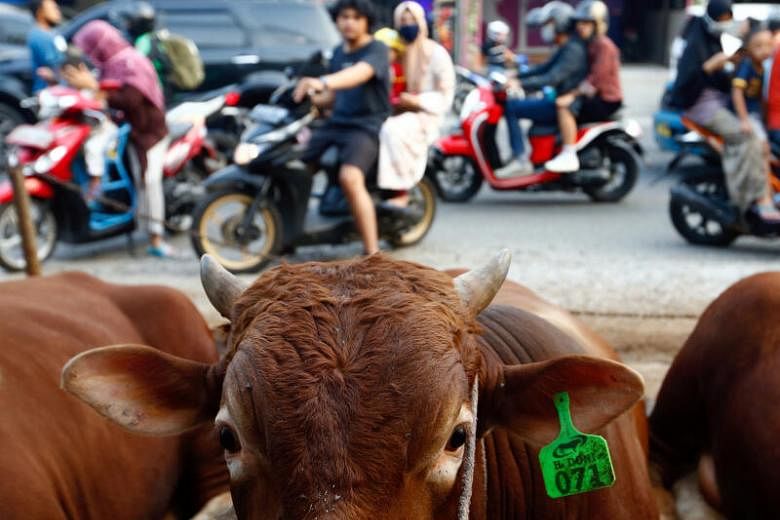On Hari Raya Haji on Friday (July 31), Indonesian farmer Pawit will be donning a face shield, mask, gloves and goggles to carry out the annual Muslim ritual of animal sacrifice, known as korban.
Together with a small team from the National Board of Zakat, a governmental agency locally known as Baznas, Mr Pawit, who like many Indonesians goes by one name, will slaughter the livestock in a butchery near his village in Magelang regency, in Central Java, as a camera clicks away.
Photos of the cattle, sheep and goat would be sent to the donors as proof of the sacrifice, and the meat - which is a form of alms - will be distributed to the poor and needy at their doorstep.
"In the past, villagers were able to gather and watch the ritual and the poor would personally come to collect the meat. But we must follow strict health measures because of the coronavirus," the 47-year-old told The Straits Times. "I feel sad, but also grateful that at least this important ritual is not cancelled."
For Muslims, korban commemorates Prophet Abraham's willingness to sacrifice his son Ishmael for the sake of God. God, in turn, replaced Ishmael with a ram to recognise Abraham's obedience.
As the global pandemic rages on, the World Health Organisation on July 25 published a list of safe practices, including using virtual platforms such as television, radio, digital and social media, to restrict social and religious gatherings and observing physical distancing in meat distribution.
In Indonesia, the world's most populous Muslim country of 270 million people, the Religious Affairs Ministry has banned public celebration in unsafe zones with high incidence of cases.
While the country's main mosque, the Grand Istiqlal Mosque in Central Jakarta, will be closed, other mosques that will be open have been advised to keep congregational prayers short and sterilise the premises. Worshippers must also wear face masks and bring their own prayer mats.
Muslim organisations and online marketplaces have also been offering special korban services online. Through websites and apps, Muslims buy live cattle, goat or sheep from local breeders and have the slaughtered meat delivered to the poor and disadvantaged.
While some have been operating for several years, the difference this year is in the slaughtering process. Instead of mosques and public spaces, the sacrifice ritual will be carried out at slaughterhouses by smaller teams. Crowds will also be barred on site to watch the process.
Baznas has joined hands with banks, electronic payment operators and online marketplaces to provide the korban service and use social media platforms to reach out to donors, its executive director, Mr Mohamad Arifin Purwakananta, told The Straits Times.
He hopes to receive 25 per cent of alms funds, including from animal sacrifice rituals, from online channels this year, up from last year's figure of 15 per cent.
"Digital technology aside, we must observe the health precautions as best as we can and ensure we perform the korban in accordance with Islamic laws," he said.
"Hari Raya is a happy day for Muslims, a day to celebrate. We will be livestreaming the sacrifice ritual so people can still witness it online," he said.
Indonesian online fundraising platform Kitabisa.com, which has been offering korban services virtually for the last five years, has tied up with 11 partners to perform the ritual in Indonesia and abroad including Palestine, Syria and Somalia.
Ms Fara Devana, the platform's public relations manager, told The Straits Times the platform has received 4,200 orders as of Tuesday, and expects more in the coming days. Last year, there were 4,600 orders. She said: "We act as a bridge for the thousands of people who want to do good by utilising technological advancements."


